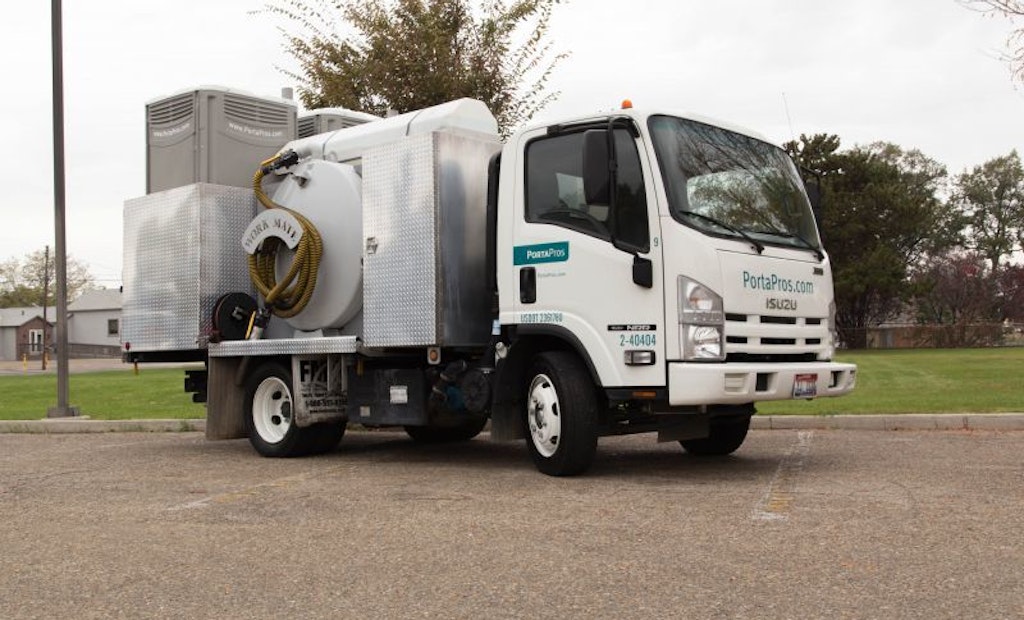Interested in Trucks?
Get Trucks articles, news and videos right in your inbox! Sign up now.
Trucks + Get AlertsTo state the obvious: Your business revolves around trucks. Service vehicles are important assets that drive the productivity and profitability of your business.
While better restrooms, routing software and deodorants have increased efficiency and improved customer service, Jeff Wilson, owner of TPI Portable Toilets and Septic Tank Services in Longview, Washington, has noticed that one piece of equipment has become more challenging in the past decade: the service trucks.
“Truck manufacturers have to be compliant, but it seems to have produced more fragile diesel engines,” Wilson says. “They’re struggling to stay running. They seem to be plagued with computer and emissions-control-related problems. We’ve found that we have a hard time keeping new diesel trucks from breaking down on the road.”
Wilson’s solution has been to convert some of his fleet from diesel to gasoline and to buy used when possible. His fleet includes vehicles by a variety of manufacturers, and he says gasoline engines have been the most reliable and cost-effective option for his midsized restroom service trucks.
“It’s an old wives’ tale that diesel is superior,” he says. “The gasoline engines have a fraction of the computers and emissions controls needed to keep the engines running. We’re getting 3 more mpg per gasoline truck compared to the diesel engines. And gasoline engines love to idle, while diesel engines do not. Our toilet truck drivers do a lot of idling. They go to a job and the truck just sits there while they clean the toilet. And you’re hurting a diesel engine when you do that. The gasoline engines are helping us be profitable.”
Good fuel economy is also important to Marcus Hunter, general manager of PortaPros in Nampa, Idaho. Hunter says the company did thorough research before deciding to invest in its Isuzu service vehicles. A key factor: The trucks get better fuel economy than the previous fleet — about 9 mpg compared to about 5 mpg.
The company owns five of the cab-over style vacuum trucks, all outfitted by FMI Truck Sales & Service with FMI’s WorkMate tanks and Conde pumps (Westmoor Ltd.).
“Each vehicle provides a combo application,” Hunter explains. “They can go out and service a route or go out as a pickup and delivery vehicle. Each truck has a liftgate that allows us to secure toilets to the bed of the truck. Three of the trucks can hold up to six restrooms and the other two can carry up to 10.”
“We wanted to minimize expenses and maximize efficiencies and capabilities,” Hunter says. “We drive our vehicles a couple hundred thousand miles a year. We also track our vehicles’ operating expenses on a cost-per-mile basis and find that, on average, the Isuzu costs about 70 cents per mile to operate versus more than $1 a mile for larger (medium-duty) trucks. So if you’re driving 200,000 miles a year, that adds up in a hurry.”
In addition, the cab-over design’s smaller wheelbase and turning radius offers greater maneuverability. “That small turning radius helps for the simple fact that when you’re picking up or delivering or servicing restrooms, you often find yourself in close quarters,” he says. “We want maneuverability to avoid bumping into things and doing damage.”
Under PortaPros’ asset-management plan, the company replaces vehicles about every five years. Hunter says that research shows the cost curve on maintaining pump trucks increases after five years, plus warranties expire after that, too. But he lauds the Isuzus for their reliability.
“They’re great vehicles,” he says. “They’re easy to use … and they’re less strenuous on our drivers because they don’t have to climb up into them. They also don’t have air brakes, which have a different level of sensitivity — they’re easy to lock up immediately and require a steeper learning curve to use. And the trucks provide greater visibility too — you can see everything.”
While Hunter found one vehicle he relies on, Wilson pays less attention to the chassis and focuses on the vacuum tanks. He prefers using slide-in tanks from Progress Tank, KeeVac Industries, Brenner Tank and FlowMark in order to easily react to problems that may arise with any given truck. About 80 percent of the truck fleet carries slide-in units that TPI Portables installs in-house.
“The slide-in tanks have really been a blessing to the portable toilet industry,” he says. “You’re no longer at the mercy of a chassis or a computer that breaks down; you can simply unbolt that slide-in and put it on another truck, and still meet your customers’ needs. It’s always going to be about meeting the customers’ needs. If you can’t meet those, somebody else will.”






